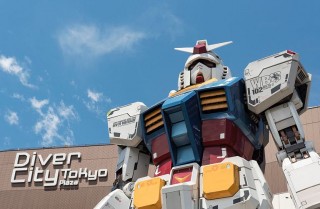Loading
Search
▼ Japan Is Sending Gundams to Space for the 2020 Olympics
- Category:Event
As Japan prepares for the 2020 Tokyo Olympics, like other countries it plans on using the occasion to celebrate its cultural heritage. That includes restoring heritage sites and upgrading its famed rail system, but as former President Obama once noted, it also extends into anime. That's why Japan plans to launch robots from the Mobile Suit Gundam series into space aboard a satellite.
In a collaboration between the Japan Aerospace Exploration Agency (JAXA) and the University of Tokyo, two models that stand just under four inches depicting Gundam and Char’s Zaku robots will be sent into orbit on a 11-inch-long, 3.9-inch-wide microsatellite.
https://youtu.be/4nxjtO8m9Pk
While the original Mobile Suit Gundam aired from 1979 to 1980 with disappointing ratings, the show saw its popularity skyrocket when Japanese toy maker Bandai acquired the rights to produce plastic versions of the show's battle robots. After seeing the toys, viewers found a series that offered what came to be called "Real Robot," a counter to the more fanciful shows about futuristic space battles.
Mobile Suit Gundam became a hit in reruns, and in 1985, the series relaunched. It's since crossed the globe and become the global face of anime. The Wizard Anime News Network once ranked Gundam the second greatest anime to ever be released in North America.
Designed by the University of Tokyo, the custom satellite will have one Gundam model mounted on top, while Char’s Zaku robot will sit in the “cockpit.” Both models will display messages of support to athletes as their eyes change color to match the Olympic flag.
The models will be custom built and made out of a protective resin to help them withstand the pressures of space. Seven cameras will monitor the models on their journey and beam the view back to Earth.
“When I heard about this project, I wondered whether they would really go through with it," says Shinichi Nakasuka, a professor at Intelligent Space Systems Laboratory, University of Tokyo, in a press statement.
"We've put satellites into orbit before, but then I thought we might be able to do something in space to help cheer on the Olympic and Paralympic Games. I'm feeling a bit of pressure as the creator of the satellite for this project, but I will turn that pressure into enjoyment and do my best."
The Olympics are always a chance for a country to show off its technological prowess, in more ways than one. The event will also feature massive uses of facial recognition and surveillance technology.
In a collaboration between the Japan Aerospace Exploration Agency (JAXA) and the University of Tokyo, two models that stand just under four inches depicting Gundam and Char’s Zaku robots will be sent into orbit on a 11-inch-long, 3.9-inch-wide microsatellite.
https://youtu.be/4nxjtO8m9Pk
While the original Mobile Suit Gundam aired from 1979 to 1980 with disappointing ratings, the show saw its popularity skyrocket when Japanese toy maker Bandai acquired the rights to produce plastic versions of the show's battle robots. After seeing the toys, viewers found a series that offered what came to be called "Real Robot," a counter to the more fanciful shows about futuristic space battles.
Mobile Suit Gundam became a hit in reruns, and in 1985, the series relaunched. It's since crossed the globe and become the global face of anime. The Wizard Anime News Network once ranked Gundam the second greatest anime to ever be released in North America.
Designed by the University of Tokyo, the custom satellite will have one Gundam model mounted on top, while Char’s Zaku robot will sit in the “cockpit.” Both models will display messages of support to athletes as their eyes change color to match the Olympic flag.
The models will be custom built and made out of a protective resin to help them withstand the pressures of space. Seven cameras will monitor the models on their journey and beam the view back to Earth.
“When I heard about this project, I wondered whether they would really go through with it," says Shinichi Nakasuka, a professor at Intelligent Space Systems Laboratory, University of Tokyo, in a press statement.
"We've put satellites into orbit before, but then I thought we might be able to do something in space to help cheer on the Olympic and Paralympic Games. I'm feeling a bit of pressure as the creator of the satellite for this project, but I will turn that pressure into enjoyment and do my best."
The Olympics are always a chance for a country to show off its technological prowess, in more ways than one. The event will also feature massive uses of facial recognition and surveillance technology.
- May 17, 2019
- Comment (0)
- Trackback(0)


